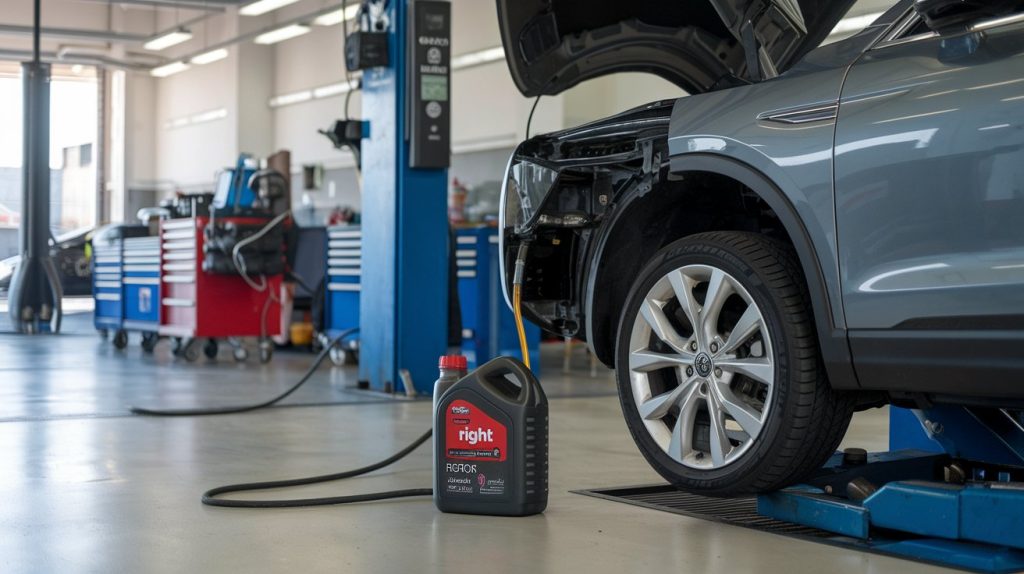Your car’s engine is the heart of your vehicle, and the right motor oil is its lifeblood. Without proper lubrication, your engine would wear out quickly, reducing performance and efficiency. Choosing the right motor oil for your car ensures that your engine runs smoothly, stays cool, and performs at its best.
Motor oil is more than just a lubricant – it protects engine parts from corrosion, reduces friction, and helps maintain the overall health of the engine. In this guide, we’ll explore why selecting the correct motor oil is crucial, the different types available, and how to make an informed decision to keep your car in top shape for years to come.
The Importance of Selecting the Right Motor Oil for Your Car
Choosing the right motor oil for your car isn’t just about matching numbers on a bottle. It impacts fuel efficiency, engine performance, and longevity.
Benefits of using the correct motor oil:
- Improved Fuel Efficiency: Proper lubrication reduces friction, making the engine run more efficiently.
- Extended Engine Life: Prevents overheating and reduces the risk of wear, ultimately extending the engine’s lifespan.
- Enhanced Performance: Keeps engine parts clean and running smoothly, ensuring consistent performance.
Using the wrong motor oil can cause poor engine function, increased fuel consumption, and premature wear. Always select oil as per manufacturer recommendations for optimal engine health.
Common Types of Motor Oil
When selecting the right motor oil, it’s essential to understand the different types available. Below is a comparison of various motor oils.
Synthetic vs. Conventional Oil
Understanding the difference between synthetic and conventional motor oils is crucial for choosing the right option for your vehicle’s engine.
Synthetic Motor Oil
- Engineered with superior base oils and additives.
- Offers better performance, stability, and protection in extreme temperatures.
- Ideal for modern engines, long driving trips, and high-performance cars.
Conventional Motor Oil
- Made from crude oil; refined to remove impurities.
- Less expensive but requires more frequent changes.
- Best for older vehicles or those with low performance demands.
High-Performance Engine Oil
For high-performance or luxury vehicles, high-performance engine oil is essential. These oils offer:
- Superior protection under high heat and pressure.
- Enhanced performance for sports cars or heavy-duty trucks.
- Best for engines that experience high-speed driving or heavy loads.
Blended Oil
Blended oil is a mixture of synthetic and conventional oils. It combines:
- The performance benefits of synthetic oil.
- The affordability of conventional oil.
- Suitable for those who need better protection without the higher cost of full synthetics.
Motor Oil Comparison Table
| Oil Type | Performance | Cost | Change Interval |
| Synthetic Oil | High | Expensive | Longer (7,500-10,000 miles) |
| Conventional Oil | Standard | Low | Shorter (3,000-5,000 miles) |
| High-Performance Oil | Extreme Duty | High | Longer (6,000-10,000 miles) |
| Blended Oil | Balanced Performance | Moderate | Moderate (5,000-7,500 miles) |
What Happens When You Select the Wrong Motor Oil
Using the wrong motor oil can lead to several engine problems. Here’s what you should know:
Common Issues with Wrong Oil
- Poor Lubrication: Incorrect oil viscosity can fail to lubricate properly, leading to engine wear.
- Reduced Fuel Efficiency: Inadequate oil can cause the engine to work harder, leading to higher fuel consumption.
- Sludge Build-up: Wrong oil may not clean the engine properly, causing sludge and debris to form.
- Overheating: The wrong oil won’t regulate engine temperature, leading to overheating.
Consequences of Using the Wrong Oil
- Increased Engine Wear: The engine components wear out faster.
- Higher Repair Costs: Poor lubrication can result in costly repairs or even engine replacement.
- Decreased Engine Lifespan: A poorly lubricated engine can fail prematurely.
Why Choosing the Right Motor Oil Matters
Selecting the right oil is a key investment in your car’s performance and longevity.It coimes up with so manay advantages, like
- Engine Protection: Keeps your engine parts well-lubricated and free from wear.
- Optimal Performance: Ensures smooth engine function, boosting power and efficiency.
- Long-Term Savings: Prevents costly repairs and reduces the frequency of oil changes.
Choosing the right motor oil is more than just a recommendation; it’s about ensuring that your car’s engine stays in optimal condition for the long run. By using the right oil, you avoid overheating, wear, and sludge buildup, ultimately saving time and money on repairs.
Benefits of Using the Right Motor Oil for Your Car
Using the right motor oil for your vehicle can provide numerous benefits. Here are some key advantages:
- Improved Fuel Efficiency: The right motor oil reduces friction in the engine, which helps improve fuel efficiency. Your engine runs smoother, requiring less energy to operate.
- Engine Protection: Proper oil ensures that the engine’s parts are lubricated and protected, preventing wear and tear and reducing the risk of overheating and corrosion.
- Increased Longevity: When the engine operates under optimal conditions, it lasts longer and requires fewer repairs.
- Reduced Wear and Tear: High-quality oil provides better protection against dirt, debris, and heat, which helps minimize wear on critical engine components.
By using the right motor oil, your vehicle will perform better, last longer, and be more fuel-efficient.
Understanding Motor Oil Grades and Viscosity
Motor oil grades and viscosity play an essential role in how effectively the oil functions in your engine. Here’s a breakdown of these key concepts:
SAE Oil Grades
The Society of Automotive Engineers (SAE) grades motor oil based on its viscosity or thickness. These grades, such as 5W-30 or 10W-40, indicate how the oil flows at different temperatures. The first number (before the “W”) represents the oil’s viscosity in cold conditions, while the second number reflects the oil’s thickness at higher temperatures.
- W stands for winter, indicating that the oil is tested for low-temperature flow.
- Higher numbers indicate thicker oils, which are typically used in high-performance or hot climate conditions.
Choosing the right SAE grade ensures that the oil flows properly through your engine, providing adequate protection in both cold and warm temperatures.
Viscosity
Viscosity refers to the oil’s thickness or resistance to flow. The correct viscosity ensures that the oil forms a stable film between engine parts, preventing friction and damage. When the oil is too thin, it may not offer adequate protection in extreme temperatures, while oil that is too thick can strain the engine and reduce performance.
Viscosity is directly tied to your vehicle’s engine type and the climate in which it operates. Always consult your vehicle’s manual to select the appropriate viscosity for your engine.
How to Read Engine Oil Labels
Engine oil labels often contain essential information like the SAE viscosity grade, the oil’s API rating (American Petroleum Institute), and whether the oil is synthetic, semi-synthetic, or conventional. The label will also specify if the oil meets specific requirements for fuel efficiency, emissions, and extended drain intervals. Understanding these labels helps you pick the right oil for your engine’s needs.
How to Pick the Right Motor Oil for Your Car
Choosing the right motor oil for your car is essential for its performance and longevity. Here are the factors you should consider:
- Manufacturer Recommendations: Always refer to your vehicle’s owner manual for the manufacturer’s recommended oil type and grade. They know best what is needed to keep your engine running smoothly.
- Climate: The climate in which you drive plays a significant role in oil selection. For instance, in colder climates, a thinner oil may be needed to ensure proper circulation, while in hotter climates, thicker oil may be more suitable to withstand higher temperatures.
- Engine Type: The type of engine in your car also impacts the type of oil you should use. Turbocharged, high-performance, or luxury vehicles may require higher-quality oils for better protection.
- Mileage: High-mileage cars may benefit from oils designed specifically for older engines, as they often contain additives that reduce leaks and improve seal condition.
By considering these factors, you can choose the best oil that meets your car’s needs and enhances engine performance.
What Are the average Costs of Motor Oil
The cost of motor oil can vary based on the type of oil you choose. Here’s a general idea of what you can expect to pay:
- Conventional Oil: Typically the least expensive option, ranging from AED 50 to AED 150 per quart. It’s suitable for older or low-performance engines.
- Synthetic Oil: Premium synthetic oils range from AED 150 to AED 400 per quart. While more expensive, these oils offer superior protection, especially in high-performance or luxury vehicles.
- High-Performance Oil: Specialized oils for high-performance vehicles may cost AED 300 to AED 500 or more per quart. These oils are designed for engines that experience extreme conditions.
- Blended Oil: A mixture of synthetic and conventional oils, costing approximately AED 150 to AED 250 per quart.
Factors affecting oil prices include the brand, additives, and the specific needs of your vehicle’s engine. While premium oils cost more upfront, they can save you money in the long run by reducing engine wear and extending oil change intervals.
Tips for Selecting the Best Motor Oil
Here are some practical tips to help you choose the best motor oil for your car:
- Check Manufacturer’s Recommendations: Always follow the manufacturer’s guidelines regarding oil type, grade, and frequency of oil changes.
- Consider Oil Grade: Choose the appropriate oil grade based on your climate, driving conditions, and engine specifications. Follow the SAE viscosity guide to ensure optimal oil flow.
- Think About Oil Additives: Some oils come with additives for enhanced engine protection, such as detergents that help clean the engine or antioxidants that prevent oil degradation. These can provide additional benefits for certain engine types.
- Read Reviews and Labels: Pay attention to oil labels, API ratings, and online reviews to determine the best quality oil for your vehicle.
By following these tips, you ensure that your vehicle operates efficiently, with reduced engine wear and better overall performance.
When to Change Your Car’s Engine Oil
Changing your engine oil is essential for maintaining your car’s performance. Here’s what you need to know:
- Frequency of Oil Changes: The typical oil change interval is every 3,000 to 7,500 miles (5,000 to 12,000 km), depending on the type of oil used and your vehicle’s needs. Need a mileage-based checklist? See how often you should change engine oil and how often to service your car overall.
- Signs that Your Car Needs an Oil Change:
- Engine Noise: If your engine starts making unusual noises, it could be a sign that the oil is old and no longer providing adequate lubrication.
- Oil Warning Light: If the oil pressure warning light comes on, it’s time for an oil change.
- Dark, Dirty Oil: If you check the oil and it appears dark and sludgy, it’s an indication that the oil has lost its effectiveness and should be replaced.
Regular oil changes ensure that the engine is properly lubricated, reducing friction and preventing damage.
Choosing Motor Oil for Different Climates (Dubai Heat)
In hot climates like Dubai, selecting the right motor oil is crucial for optimal engine performance. Here’s how extreme heat affects motor oil and what you should consider:
- Impact of Extreme Temperatures: High temperatures can cause motor oil to thin out, reducing its effectiveness in protecting the engine. In addition, engine parts can suffer from excessive wear and overheating.
- Oil Recommendations for Hot Climates: In hot climates like Dubai, it’s advisable to use high-viscosity oils (such as 5W-40 or 10W-40) to ensure the oil remains thick enough to provide adequate lubrication. Synthetic oils are often recommended due to their superior performance at high temperatures.
- Consider Heat Resistance: Look for oils that are specifically designed for high-temperature environments, as they will offer better resistance to breakdown and protect engine components from heat-related damage.
In Dubai, where temperatures can soar, using the right oil ensures that your engine operates smoothly and avoids overheating or damage from the intense heat.
Car Engine Oil Services in Dubai
In Dubai, professional car engine oil services are essential due to the extreme heat and driving conditions. Local service providers offer a range of oil change services, from basic oil replacements to comprehensive oil checks and maintenance packages. These services help keep your engine running smoothly by ensuring the right oil is used for optimal performance.
Importance of Oil Change Services in Dubai’s Unique Climate: Dubai’s high temperatures can cause rapid oil breakdown, which is why regular oil changes are critical. Oil change services in Dubai often include checking the oil’s viscosity, ensuring it is suitable for high-heat conditions. Our service center also offer synthetic oils, which provide better heat resistance and are ideal for protecting your engine in Dubai’s scorching heat. Proper oil maintenance in Dubai prolongs engine life and ensures reliable performance, even in extreme weather.
Best Motor Oil for Dubai Roads
Dubai’s unique climate and road conditions require specialized motor oils to ensure optimal engine performance. The high temperatures and dusty conditions can put extra strain on your car’s engine, making it essential to choose the right oil.
Best Oils for High-Performance Engines in the UAE: For high-performance engines in the UAE, synthetic oils like 5W-40 or 10W-40 are highly recommended. These oils maintain their viscosity better under high heat and provide better protection against wear and tear.
Factors that Make Dubai Roads Different: Dubai roads are often subjected to intense heat, traffic, and long distances. As a result, motor oils designed for Dubai must be able to handle extreme temperatures and maintain consistency even under stress. Oils with enhanced protection against sludge formation, oxidation, and thermal breakdown are ideal for ensuring smooth engine operation on Dubai’s hot and demanding roads. If you’re driving a newer powertrain, this primer on hybrid cars rising in the UAE helps with maintenance expectations.
Choosing the right motor oil is vital for ensuring the longevity and performance of your vehicle. By understanding the various oil types, viscosity grades, and the specific needs of your car’s engine, you can make an informed decision that benefits both your engine and your wallet. The climate in Dubai, with its extreme heat and unique road conditions, demands special attention when selecting motor oil, and opting for the right oil can prevent costly repairs in the future.
Regular oil changes, professional maintenance services, and choosing high-quality oils will ensure your car continues to run smoothly for years to come. Always consult your vehicle’s manual, and don’t hesitate to seek advice from experts to maintain optimal engine health.
Frequently Asked Questions
- How often should I change my car’s motor oil?
It depends on the type of oil you use and your driving habits, but generally, every 3,000 to 7,500 miles (5,000 to 12,000 km) is recommended. - Can I mix synthetic and conventional oils?
It’s not recommended to mix oils, as they have different properties. Mixing could affect performance, but it won’t harm your engine in an emergency. - What does the “W” in motor oil grades mean?
The “W” stands for winter, indicating that the oil has been tested for low-temperature performance. The lower the number before the W, the better the oil flows in cold weather. - What is the best motor oil for high-mileage cars?
High-mileage cars benefit from oils formulated with additives that help restore seals and reduce leaks. High-mileage oils typically start at 10W-40 or 5W-30. - Is synthetic oil worth the extra cost?
Yes, synthetic oil offers superior protection, higher performance, and longer intervals between oil changes, which can offset the extra cost in the long run. - How do I know which oil is best for my car?
Check your vehicle’s manual for manufacturer recommendations. Look for oil with the correct viscosity and specifications for your engine. - Can I use a different oil brand than the one recommended by the manufacturer?
While it’s ideal to use the recommended brand, any oil that meets the correct specifications and viscosity should work fine. - What are the signs that I need an oil change?
Common signs include low oil levels, the oil warning light on the dashboard, engine noise, and dirty or dark-colored oil. - Does oil color matter?
Oil color changes over time as it collects contaminants. Dark oil doesn’t necessarily mean bad oil, but if it’s sludgy, it’s time for a change. - Can I use oil additives with motor oil?
Most modern motor oils already contain additives, so additional ones aren’t necessary. If you are unsure, consult your car manual before using additives.



